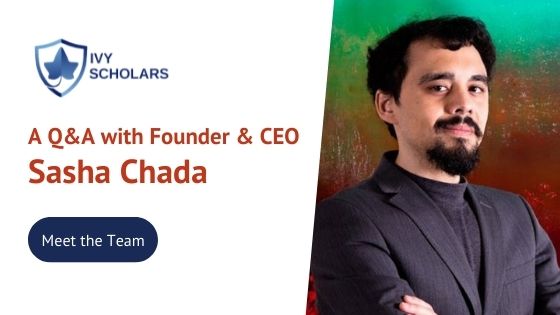Describe your journey into college admission coaching? When and how did it happen?
Like a lot of professionals in this field, my career started early with volunteering experiences where I worked with other students. I had a lot of fun doing volunteer tutoring and test preparation when I was in high school; I enjoyed giving younger students the help I wish I received. When I started at my alma mater, Johns Hopkins University, I knew I didn’t just want to study there. I wanted to be a real part of an institution that was over a century old.
From day one, I was involved in residential life. I moved from being a Student Activities Group volunteer to a Tour Guide, to working as a Student Employee for fundraising and financial aid. At first, I wanted to move into academic counseling, but my proximity to the Office of Undergraduate Admissions really affected my perspective on admissions as a whole. I realized that there was so much I didn’t know when I was applying, and that the mad scramble my peers (and parents!) made for the information on how to be more competitive could be made so much more efficient.
As I learned about Johns Hopkins’ undergraduate admissions procedures from the perspective of the Office of Undergraduate Admissions, I realized I was working on the wrong side of the desk. As much as I enjoyed helping the university find and cultivate the brightest young minds around, I couldn’t forget how my friends and I found the university application process so daunting. I wanted to help the next generation of students understand the most effective ways to structure their education, avoiding the pitfalls I made and capitalizing on every opportunity they wanted. Even more, I wanted my students to feel confident that they understood the competitive admissions process and were in control of their candidacy.
I knew the system, and I knew how to connect with people and help them learn. I saw a way to meld my interests in counseling and admissions and became an admissions counselor; thus Ivy Scholars was born. I started by counseling a small group of students from Houston and Sugar Land high schools, and word of mouth spread quickly. As some students moved back to their home countries, I started distance learning internationally. Demand increased, and I opened group classes and admissions workshops to help more students at once, eventually adding Elite Test Prep Instructors and Admissions Mentors to make sure students never lacked for our attention.
What exactly does Ivy Scholars do?
Ivy Scholars builds students into candidate material for top-tier universities. We offer tutoring and test prep and use that time to build a relationship with the student so that when their applications come due, the rock-solid rapport needed for a good team is already there.
Of course, admissions strategy is our biggest job. Many teens feel intimidated by a long-term project with plenty of ambiguities and no clear benchmarks of progress. Ivy Scholars helps students see every step of their admissions process clearly, which goes a long way towards reducing anxiety. By their tenth hour with Ivy Scholars, every student has their entire admissions process broken down into week-by-week priorities, with monthly benchmarks to gauge progress. This keeps students and parents comfortable – they don’t have to wonder if they’re on track for admissions deadlines, because our metrics can confirm they’re on-target for their goals.
We see plenty of parents who are dedicated to giving their children the best education they can. They find that the breadth and depth of our admissions knowledge is one of the best tools they can employ to build their children’s futures. We take profile-building activities – extracurriculars, summer programs, volunteering, internships, advanced coursework – to the next level and make sure no opportunity or deadline is ever forgotten.
Our students have taken graduate-level classes at Rice, interned with medical, legal, and management professionals at the top of their fields, treated cancer patients, engineered lifesaving medical devices, and even coordinated emergency rescue activities for natural disaster relief. I emphasize accomplishment because Ivy Scholars recognizes – sometimes to a greater extent than local high school counselors – that awards, honors, and titles are increasingly devalued in competitive admissions. Far too many students fight to be a participant in a selective program, the president of a club, on the board of a nonprofit – and then have few meaningful responsibilities once given the opportunity.
Many applicants don’t realize that having their talents recognized and then failing to capitalize on their opportunities is even worse than going unrecognized. In their drive to look like good candidates, too many top students give universities the impression that they’re trying harder to look like good candidates than to learn and grow.
All-Ivy Scholars students leave internships with demonstrable evidence of their contribution to their organization. We pin down a part of the organization’s mission that strikes a delicate balance: important enough to consider meaningful, but not so important that a well-supervised high school student couldn’t be involved. This experience helps students develop a sense of accountability as well. Many of our students are used to being the top few students at their local high school, so challenging them to contribute on a professional level helps them get comfortable being the metaphorical big fish leaving the small pond.
What makes Ivy Scholars unique, and how are you different from other coaches and companies?
I’ve come to appreciate the weight of the responsibility entrusted to me by parents. They’re relying on me to help their son or daughter reach universities that can do so much to change their lives. Beyond expertise, I think the way anyone earns this trust is by having the right attitude. When I was in high school, I read 7 Habits of Highly Effective People, and Habit 5 (“Seek First to Understand”) struck me as the most important. Trying to understand students’ perspectives, rather than giving them your perspective and hoping they come to see things as you do, is how you show you really care about their intellectual development.
An educator’s biggest job isn’t to disseminate information – that’s what videos, textbooks, and articles are for. The best teachers work hard to form a mentoring relationship that augments a student’s ability to learn. They help students become conscious of problem-solving style and strategy, coaching specific techniques while creating awareness of how those fit together into the discipline as a whole. In other words, they help students improve as scholars.
Almost all Ivy Scholars students enter with some doubt – they’re wary of teachers that tell them what to do and how to do it but pay no attention to the “click” moment. Ivy Scholars takes ownership of creating comprehension and mastery, cutting out all the busywork, all the repetition – everything but those moments. That’s why our students succeed.
What are the most significant challenges you see students and parents facing in today’s admission environment?
We throw students into an admissions process that’s more competitive than ever before, and then into a job market that’s radically different from the previous generation’s. The university-to-career pipeline has never been more fragmented; most selective universities don’t see themselves as career prep programs – but too often parents do. It can be intimidating to think that positioning oneself to develop marketable skills is a process that needs to start in high school, but the truth is that early birds have a leg up in professional development. Students interested in competitive programs like engineering, medicine, and business should start thinking about their admissions profile from the beginning of freshman year to make sure they aren’t edged out by competition.
What type of students do you work with? Are there any requirements or minimum grades/test scores to become an “Ivy Scholar?”
No, we alter our admissions consulting to fit each student we get. We are not wizards, however, and part of my job is helping parents and students find the school that will fit them best. I do not need minimum grades and test scores for this, but there is a level of self-reflection required.
While the majority of students Ivy Scholars works with are suited for and interested in attending top-tier institutions, around 40% are aimed at more local schools. Texas A&M, Baylor, SMU, all good schools, and all with their own admissions challenges, but not the same level of difficulty or competitiveness as Stanford or Harvard.
I enjoy helping students of all ability levels achieve their college dreams and guiding them through the admissions process.
Any closing thoughts or advice for students and parents tackling the admission process?
“Seek first to understand” runs both ways. Students who develop a deeper understanding of the culture of the universities they apply to can communicate with those universities more meaningfully. One of the first lessons, when we begin the admissions consulting process, is that joining a university isn’t just about intellectual aptitude. Top-tier universities, especially Ivy League schools, are defined by a shared approach to scholarship. The phrase “Liberal Arts Education” increasingly gets a bad rap from parents and educators concerned that liberal arts degrees no longer have the value they used to, or from students worried they’ll be excluded for their passion for science, technology, engineering, or mathematics (STEM). Both of these couldn’t be farther from the truth. The Liberal Arts Education that Ivy League schools provide doesn’t refer to a group of majors – it’s present in business, STEM, architecture, and so on.
It’s an approach that emphasizes Socratic learning, in which reasoned, creative discussion with peers and professors serves as each student’s primary intellectual proving ground. At other universities, this would risk collapsing the classes’ evaluation methods and delaying their curriculums. It’s a testament to the quality of students and professors at these top-tier universities that instead the ability to analyze and challenge each other’s ideas leads students to learn in more meaningful ways than any other educational institution can provide. More to the point, the immediacy and cognitive flexibility demanded by these discussions help students build the theoretical groundwork not only to lead existing fields but to innovate into entirely new ones.
Many Ivy League applicants will choose majors outside the liberal arts, but none should discount the value of integrating this approach into their education. Ivy League universities weren’t founded to prepare students for great careers, though they do so exceptionally well. They were founded to give social and intellectual leaders of the next generation the opportunity to push each other to excel. Students who make admissions officers believe that they’re ready to join this community get accepted. Those who don’t are rejected.








